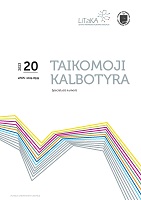Būdvardiškųjų žodžių derinimo ryšio įsisavinimas dvikalbystės sąlygomis
The Acquisition of Adjective Agreement by Bilingual Children
Author(s): Jonas StepšysSubject(s): Morphology, Syntax, Language acquisition, Sociolinguistics
Published by: Vilniaus Universiteto Leidykla
Keywords: adjective; agreement; morphosyntax; bilingualism; inflection;
Summary/Abstract: While studies on the acquisition of adjective agreement in the Lithuanian language are scarce, some research indicates that children face challenges in understanding morphosyntactic relationships, leading to errors in the use of adjectives and nouns in agreement. Consequently, children may switch less common inflections to more common ones, select declension paradigms based on analogy to other words, and exhibit errors in the grammatical category of gender. The present study investigates adjective agreement in bilingual children. Thirty-five bilingual children residing outside Lithuania completed a task based on a corpus of children’s and child-directed speech. The experimental task aimed to capture the diversity of adjective and noun paradigms. Test choices included, alongside the correct one, a paradigm error (a different paradigm inflection), a number error (a different number in the target paradigm), and a gender error (a different gender in the target paradigm). Results reveal that bilingual children encounter the most difficulty with agreement due to inflectional diversity, involving changes in inflection from unproductive to productive paradigms and copying noun inflections. Agreement errors in gender and number are also associated with paradigm diversity.
Journal: Taikomoji kalbotyra
- Issue Year: 2023
- Issue No: 20
- Page Range: 172-182
- Page Count: 11
- Language: Lithuanian

